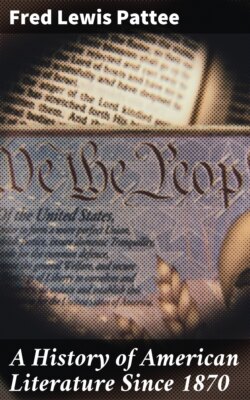Читать книгу A History of American Literature Since 1870 - Fred Lewis Pattee - Страница 19
На сайте Литреса книга снята с продажи.
VII
ОглавлениеTable of Contents
In all the humorous writings of the period there was a deep undercurrent of wisdom. Ever since the days of Franklin, the typical American has been a maker of aphorisms quaintly expressed. The man who for years has wrestled with Nature on frontier or farm has evolved a philosophy of his own. American life has tended to produce unique individualities: "Sam Slicks," "Natty Bumppos," "Pudd'nhead Wilsons," "David Harums," and "Silas Laphams,"—men rich in self-gained wisdom, who talk in aphorisms like Lincoln's, "Don't swap horses when you are crossing a stream."
There has been evolved what may be called the American type of aphorism—the concentrated bit of wisdom, old it may be, but expressed in such a quaint and striking way as to bring surprise and laughter. The humor may come from the homeliness of the expression, or the unusual nature of the compared terms, or the ludicrous image brought suddenly to the mind. Examples are easily found: "Flattery is like kolone water, tew be smelt of, but not swallowed"; "It is better to be a young June bug than an old bird of paradise"; "The man who blows his own trumpet generally plays a solo"; and "A reasonable amount of fleas is good fer a dog—keeps him from broodin' over bein' a dog."
The leader of the latter-day proverbialists was Henry Wheeler Shaw, a native of Massachusetts, a student for a time at Hamilton College, and then for twenty years a deckhand, farmer, and auctioneer in Ohio. He was forty before he began to write. His "Essay on the Mule," 1859, found no favor. Rewritten the next year in phonetic spelling and submitted to a New York paper as "A Essa on the Muel, bi Josh Billings," it became quickly famous. The people of the early seventies wanted local color. the tang, as it were, of wild fruit—life, fresh, genuine, and first-hand. They gave a languid approval to Holmes's Poet of the Breakfast Table, but bought enormous editions of Josh Billings' Farmers' Allmanax. The edition of 1870 sold 90,000 copies in three months; that of 1871 sold no fewer than 127,000.
The humor of "Josh Billings" is confined to his aphorisms. In his longer writings and indeed in his lectures, as we read them to-day, he is flat and insufferable. He has little of the high spirits and zest and lightness of "Phœnix" and "Ward": he began his humorous work too late in life for such effects; but he surpasses them all in seriousness and moral poise. That the times demanded misspelling and clownishness is to be deplored, for Shaw was a philosopher, broad and sane; how broad and sane one can see best in Uncle Esek's Wisdom, a column contributed for years to the Century Magazine, and, at the request of J. G. Holland, printed in ordinary spelling.
"With me everything must be put in two or three lines," he once declared, but his two or three lines are always as compressed as if written by Emerson. He deals for the most part with the moral side of life with a common sense as sane as Franklin's. So wide was the field of his work that one may find quotations from him on nearly every question that is concerned with conduct. His stamp is on all he wrote. One may quote from him at random and be sure of wisdom:
The best cure for rheumatism is to thank the Lord it ain't the gout.
Building air castles is a harmless business as long as you don't attempt to live in them.
Politeness haz won more viktorys than logick ever haz.
Jealousy is simply another name for self-love.
Faith was given to man to lengthen out his reason.
What the moral army needs just now is more rank and file and fewer brigadier generals.
